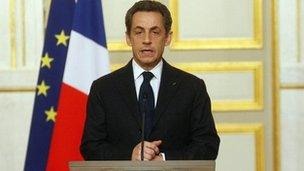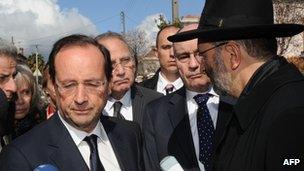French shootings and the presidential elections
- Published
- comments

Mr Sarkozy said terrorism would not be able to "fracture our national community"
After the killings at the school in Toulouse, French candidates suspended their election campaigns. That did not, of course, suspend politics.
All the campaigns have been busy making their calculations. What impact will the shootings have on the first round of voting in the presidential elections on 22 April?
In the short term it is likely that President Nicolas Sarkozy will benefit. Very quickly he took charge. He rushed to the scene. He suspended his campaign. He spoke as the president of the republic.
He called for a minute's silence. He brought together Jewish and Muslim leaders. His interior minister has been on the ground at the siege in Toulouse directing operations and briefing the media. In a crisis, incumbent leaders often have the advantage.
'Untested' Hollande
The shootings also play into a narrative that the Sarkozy campaign have been stressing; that the president is a man of experience, of crisis management while his main opponent, Francois Hollande, is untested.
The background and motive of the suspect, however, has changed calculations. There was a presumption in most French papers that this was a racist attack carried out by a gunman from the far right.

Francois Hollande visited the Jewish school where three children and a teacher were murdered
It led the centrist candidate Francois Bayrou to criticise the tone of the campaign and what he called the "growing climate of intolerance".
This was seen as a reference to President Sarkozy's remarks about the failure of integration and his demand that there be no special treatment for minorities. He had made an issue over slaughtered halal meat, calling for all halal or kosher meat to be labelled.
His critics accused him of pandering to the far right in a bid to take votes away from Marine Le Pen. The far left candidate, Jean-Luc Melenchon, urged people to "choose their words and their quotations more carefully". The Socialist candidate Francois Hollande also spoke about the risk of "words that influence".
But today the script changed. It emerged that the suspect was 23-year-old Mohammed Merah, a French national of North African origin.
He has apparently claimed a connection with al-Qaeda and has visited Pakistan and Afghanistan. He told negotiators that the killing of the Jewish children and the attacks on French soldiers of North Africa origin was "revenge on behalf of Palestinian children".
The revelations have altered the political fall-out. Far-right candidate Marine Le Pen, who might have been damaged if this had been an extreme right attack, came out and said "we have minimised the rise of radical Islam in this country... we did not want to look it in the face".
She said that France should wage war against "these fundamentalist political and religious groups that are killing our children".
Almost certainly, France will again debate immigration and the failures of integration.
This is territory that usually benefits candidates from the right and centre-right but after the killings the tone of the campaign is likely to soften.
The incident has enabled Nicolas Sarkozy to play the role he likes best, a man of action and decision in a crisis. Francois Hollande, the Socialist candidate, will want to try and get attention back to taxes and the economy.
So will the tragic events in Toulouse change the course of the election? Probably not.
The first round of voting is over a month away and France's national focus on these attacks will fade. The election will turn on leadership, the economy and whether voters want another five years of Nicolas Sarkozy.